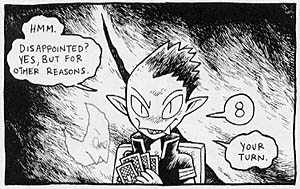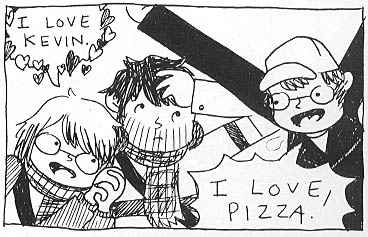 By Liz Prince, Bwana Spoons, and Kazimir Strzepek
By Liz Prince, Bwana Spoons, and Kazimir Strzepek
32 pages, black and white
Published by Tugboat Press
When I initially read Papercutter #4-6, the Greg Means-edited anthology comic, I figured I would just review all three issues at once, devoting a small amount of space to each issue. It wasn’t until I sat down that I realized that each issue really deserved its own review; the works on display here are just that strong that you can’t dismiss them with a single sentence in passing. In the case of Papercutter #5, I think Means continued to find the balance he struck in #4, with a good mix of styles and creators. I didn’t think a apocalyptic fantasy story would fit alongside a story of a relationship being born, but Means proved me absolutely wrong.
 The lead story for Papercutter #5 is a side adventure from Kazimir Strzepek’s graphic novel series The Mourning Star. As someone who had only just recently read The Mourning Star Volume 1, I was delighted to get a chance to read something else from Strzepek. He’s very careful to not leave new readers in the dust, here, setting up the world where a comet crashing through the atmosphere a year earlier has changed and warped the world into a land of opposing forces, spies, and supernatural creatures. “Side Story” is just out and out entertaining, as we stop in on a group of villains preparing to attack an enemy camp. It’s inventive with its dream-eater spirits flitting through the story, and despite the fact that there’s really almost no one you want to do well, I was sucked right into the action and wanted to see more. Strzepek’s art, with its pointed ears, demonic eyes, and noseless faces, is really not quite like anything else I’m used to seeing in comics, but it’s really good. “Side Story” will almost certainly make new readers want to see more of The Mourning Star (especially since I promise, there are good guys there!) and existing readers all the more anxious for Volume 2.
The lead story for Papercutter #5 is a side adventure from Kazimir Strzepek’s graphic novel series The Mourning Star. As someone who had only just recently read The Mourning Star Volume 1, I was delighted to get a chance to read something else from Strzepek. He’s very careful to not leave new readers in the dust, here, setting up the world where a comet crashing through the atmosphere a year earlier has changed and warped the world into a land of opposing forces, spies, and supernatural creatures. “Side Story” is just out and out entertaining, as we stop in on a group of villains preparing to attack an enemy camp. It’s inventive with its dream-eater spirits flitting through the story, and despite the fact that there’s really almost no one you want to do well, I was sucked right into the action and wanted to see more. Strzepek’s art, with its pointed ears, demonic eyes, and noseless faces, is really not quite like anything else I’m used to seeing in comics, but it’s really good. “Side Story” will almost certainly make new readers want to see more of The Mourning Star (especially since I promise, there are good guys there!) and existing readers all the more anxious for Volume 2.
 Liz Prince’s “Act One: They Meet” is nothing short of adorable. Those who have read Prince’s comics such as Will You Still Love Me If I Wet The Bed? know all about Liz and Kevin’s relationship, so finally getting their first meeting is a nice milestone for Prince’s works. It’s short and sweet, but it captures the excitement and instant attraction that sometimes happens at the start of a relationship. Liz and Kevin’s shoe conversation is great in part because Prince writes it in such a way that it’s clearly not just about shoes, but rather two similar people realizing how much alike they are. Add in how Prince draws her characters, in such a soft, innocent way, and you can’t help but be charmed by Prince’s story. (Or alternately, you’ll need some insulin on hand.) Prince’s final panel, with Liz’s word balloon surrounded by little hearts, will either send you shrieking in the other direction or absolutely charm you. Personally, I fell into the latter category.
Liz Prince’s “Act One: They Meet” is nothing short of adorable. Those who have read Prince’s comics such as Will You Still Love Me If I Wet The Bed? know all about Liz and Kevin’s relationship, so finally getting their first meeting is a nice milestone for Prince’s works. It’s short and sweet, but it captures the excitement and instant attraction that sometimes happens at the start of a relationship. Liz and Kevin’s shoe conversation is great in part because Prince writes it in such a way that it’s clearly not just about shoes, but rather two similar people realizing how much alike they are. Add in how Prince draws her characters, in such a soft, innocent way, and you can’t help but be charmed by Prince’s story. (Or alternately, you’ll need some insulin on hand.) Prince’s final panel, with Liz’s word balloon surrounded by little hearts, will either send you shrieking in the other direction or absolutely charm you. Personally, I fell into the latter category.
 “The Tea Party” by Bwana Spoons is a story that I’m still not entirely sure how to feel about. It’s a short story about three friends at a tea party, sharing gossip about a fourth person and what they’d heard about him. It’s strange, because some panels work great for me—such as the three of them leaping up in terror when a story involving toe-snatchers coming up through the floorboards, with hysterically funny expressions and a real sense of energy on display—but other panels just look like a jumbled mess, perhaps in part because of how Spoons overlays graytones on his ink lines. And while I normally wouldn’t call attention to it, the number of grammatical errors (several misspelled words, and a sentence that seems to be missing a word) was ultimately distracting. It could have been intentional to give the character a certain voice, but it unfortunately came across as a little rough and unpolished. “The Tea Party” is by no means a bad story, but it’s a mixed bag in a series that is normally full of nothing but excellent contributions.
“The Tea Party” by Bwana Spoons is a story that I’m still not entirely sure how to feel about. It’s a short story about three friends at a tea party, sharing gossip about a fourth person and what they’d heard about him. It’s strange, because some panels work great for me—such as the three of them leaping up in terror when a story involving toe-snatchers coming up through the floorboards, with hysterically funny expressions and a real sense of energy on display—but other panels just look like a jumbled mess, perhaps in part because of how Spoons overlays graytones on his ink lines. And while I normally wouldn’t call attention to it, the number of grammatical errors (several misspelled words, and a sentence that seems to be missing a word) was ultimately distracting. It could have been intentional to give the character a certain voice, but it unfortunately came across as a little rough and unpolished. “The Tea Party” is by no means a bad story, but it’s a mixed bag in a series that is normally full of nothing but excellent contributions.
After reading Papercutter #4, I was hoping that the next issue would be just as strong. While I wouldn’t go quite that far in my praise of this issue, it is still a good, solid read. As an anthology editor, Means definitely knows what he’s doing. With Papercutter #6 being assembled by a guest-editor (and of which a review is forthcoming), I must say that I’m looking forward to see what Means does next with Papercutter #7. I’ll certainly be contenting myself with picking up the earlier issues, though. Good stuff.
